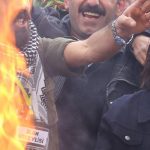By Yavuz Baydar
The race is on.
With less than 60 days to go before local elections in Turkey, the mood among politicians is already at an ”all or nothing” level. There is a political dogfight underway in a country where identity politics, corruption and fear have polarised society.
The annual survey on social and political trends conducted by Kadir Has University in Istanbul said one in five citizens want to emigrate and even a third of supporters of the ruling Justice and Development Party (AKP) agree Turkey has become more authoritarian than ever before.
As we approach the March 31 elections, for the first time in more than a decade, the economy tops the agenda, ahead of terrorism, as the issue most concerning voters. The approval rate for both President Recep Tayyip Erdoğan and his party has dropped considerably, although loyalty to the AKP remains strong.
Anti-American sentiments have reached an all-time high, with 82 percent expressing antipathy. The media is Turkey’s least trusted institution, according to the survey, with just 37.5 percent saying Turkey has freedom of expression, down more than 10 points from the previous year.
Against this backdrop, the debate is mainly about what the opposition sees as massive electoral engineering by Erdoğan and his ultra-nationalist allies. A high number of fake voters have been registered in some districts, including hundreds more than 120 years old.
Meanwhile, the tenure of the Supreme Electoral Board (YSK), which oversees the polls, was unexpectedly, and according to legal experts unlawfully, extended. The YSK’s categorical rejection of complaints about fake voter registration have confirmed fears about vote rigging. Fear is spreading among the opposition that Erdoğan and the AKP would never accept electoral defeat.
Although under increasing pressure due to worsening economic prospects, the president is as determined as ever to conduct the election campaign using his trademark polarising tactics. His attacks on the secular main opposition aim to prevent it cooperating with the pro-Kurdish Peoples’ Democratic Party (HDP), which has been weakened by a relentless crackdown with scores of its leaders and officials jailed on terrorism charges.
Blocking free debate as much as he can, Erdoğan’s priority is to dispense of the notion that the local elections are in any way a referendum on his one-man rule. On Sunday, Erdoğan said the HDP is equal to the Kurdistan Workers’ Party (PKK), which has fought an insurgency in Turkey’s southeast since 1984 and is labelled a terrorist group by Turkey and the United States.
By any measure, the HDP is a hot potato for the secular-nationalist opposition alliance, which has a similar anti-Kurdish, populist stance on the three-decades-old conflict in the southeast as the government. The alliance is extremely weak in Kurdish areas, but fears any move to close ranks with the HDP would also tar it with the same brush. Erdoğan is masterful at playing the Turkish nationalism card.
But given that the race is neck in neck in the big cities and the west of the country, the opposition bloc is anxious to attract HDP voters – the only way, it seems, to turn the balance in its favour. If the big municipalities such as Istanbul and Ankara are won by Erdoğan’s rivals, it will not turn the clock back toward democratisation, but it will shake up the current power balance, perhaps opening the door to a softer hand from the government.
Last week, after much internal brainstorming, the HDP announced it was not fielding candidates for mayor of seven key cities: Istanbul, Ankara, Mersin, Adana, Antep, Urfa and Izmir. The move is a cunning gambit to spoil Erdoğan’s game. Almost all of the cities have a significant HDP voter base that could add three or four points to the votes of centrist-nationalist opposition mayoral candidates.
But the strategy has its risks. For the first time, traditional secular and Kurdish party supporters are so frustrated with the political class that a very strong undercurrent is emerging of voters vowing not to turn out for the ballot. Between 20 percent and 30 percent of them are reportedly undecided.
But the HDP appears confident. “We trust our supporters, and we shall see to it that at up to two-thirds in those cities will cast their vote against the oppressors,” a top HDP figure told me.
I am not sure. Given the political engineering at play, the most realistic expectation would be for yet another disappointment for Turkey’s disunited opposition.
But one point is clear, the HDP’s self-sacrifice in this election is a final act of despair, because after March 31, there is not another election due in Turkey until 2022. And of course, without boldly and democratically tackling the nightmarish Kurdish question at home, Turkey’s political elite will continue to chase its tail.



